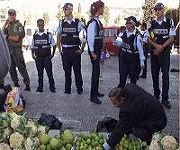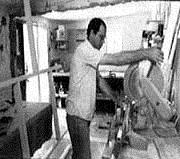
Get to the land through disintegration of the economy, repress hope and starve the spirit; call it a ‘peace process.’
The world watches breathlessly for Israel to heroically disengage from Gaza, successfully painting the Palestinian people with the brush of terrorism such that ignorant individuals across the world consider the Annexation Wall, a warranted shield from the ‘infidels of violence’ relegated to the other side of it. Nations sit back and watch and slowly the economy of Palestine shrinks and the Palestinian people force themselves to find yet another way by which to stretch the resources they still have in their possession further still. Prolonged occupation pushes more and more people into poverty. Today, 2,213,000 Palestinians live below the poverty line which is subsistence on less than $3.1 dollars a day. The West Bank and Gaza’s total population is 3,600,000, meaning that 61.5 percent of Palestinians live below the poverty line.
Israeli Foreign Minister, Shimon Peres, would have the world believe that, “poverty does not cause terrorism; terrorism causes poverty.” But the violence between Palestine and Israel only began because of the lack of productive dialogue for a cooperative solution, creating a situation of great frustration to the ‘ordinary’ Palestinian. Nigel Roberts World Bank Country Director for West Bank and Gaza states that, “Too often in the course of this conflict, economic considerations have been dealt with as a residual element in diplomacy. Given the depth of the economic crisis in the West Bank and Gaza, securing work and a future for one’s family features very high on the agenda of the ‘ordinary’ Palestinian, and needs to be catered to as [the] top priority.”
The ‘family’ of Palestine roughly translates to about 1,963,438 children, since 52.7 percent of the Palestinian population is between the ages of 0 and 17 years old.
“Closures are a key factor behind today’s economic crisis in the West Bank. [Israel has] fragmented Palestinian economic space, raised the cost of doing business and eliminated the predictability needed to conduct business,” says Roberts.
The Israeli security measures which include (1) checkpoints, (2) partial checkpoints, (3) roadblocks, (4) road gates, (5) earth mounds (6) earth walls, and trenches, and (7) the Annexation and Segregation Wall create cumbersome and costly obstacles to delivery of goods and services, this without mentioning the damage to the economy inflicted through the confiscation of 2,322,004 dunnums of agricultural lands, 73,613 dunnums of razed land, the estimated 1,186,497 uprooted trees (See MIFTAH Facts and Figures).
The Paris Protocol effectively pushed Palestine into almost complete economic dependence with Israel. The Occupied Palestinian Territories continue to rely on Israel as the principal market for absorbing more than 90 percent of its imports; trade is complicated still further by Israel’s unilateral control of borders and a highly bureaucratic, institutionalized and discriminative permit system.
Labor also depends on Israel; statistics from 2000 cite that 97 percent of Palestinian businesses had fewer than 10 employees. Unemployment is at about 28.8 percent in the West Bank and 38 percent in Gaza, according the Palestinian Bureau of Statistics for 2005. In Palestine, the small and medium enterprises make up the majority of the economy, but cannot hope or strive to absorb the substantial labor market. As a result there is a relatively high structural unemployment, and after the second intifada Israel has restricted its use of Palestinian labor.
Closures present impediments to reinvigorating the economy. The perspicacious statement by sixty Israeli citizens convened at a conference to discuss the ‘Emerging Apartheid in Israel’ on September 12, 2000 seems today prophetic: “The establishment of a Palestinian state truncated by a massive system of by-pass roads, encircled by Israeli settlement blocs, subject to closures and restrictions on freedom of movement and commerce, with no control of its borders or natural resources, will only create a reality of apartheid; a Palestinian state as a Bantustan.” And so it seems.
Recently Condoleezza Rice, the US secretary of state, was in Lebanon on Friday July 21st to offer support for the new government. She condemned Syria's use of severe customs restrictions. The restrictions have been interpreted as a show of authoritative power by Syria against its smaller neighbor following Lebanese public protests in March that resulted in the withdrawal of 15,000 Syrian troops and intelligence personnel from Lebanon after 30 years. Syrian officials maintain that the newly implemented system of meticulous inspection is simply a ‘security measure’ and part of their response to American pressure to prevent militants and arms passing through their country on their way to Iraq.
That rhetoric should sound somewhat familiar.
"Good neighbors don't close their borders," Rice said of Syria. "This is a very serious situation where Lebanese trade is being strangled and we hope it will [be] remedied very soon."
That rhetoric also should sound somewhat familiar.
Loss of Palestinian jobs in Israel contributes to unemployment. Closures limit access to external markets and create an unpredictable marketplace resulting in the exaggerated distortion between Palestinian imports to exports and making foreign investment within Palestine risky. Destruction of property (olive trees), confiscation of land, and closures contribute to lower agricultural production. Disintegration of the economy lowers incomes, consumption, and savings and contributes to the rising poverty level. Poverty contributes to desperation. Desperation and frustration is perhaps the only thing sustainably developed within the Palestinian territories. The current ‘peace’ process is not neighborly and its objective is not peace, but domination and land acquisition.
Sara Roy in her piece, ‘Ending the Palestinian Economy’ describes the solution to the current economic decline as political, warning that, “this oncoming collapse [of the economy] is not a matter of rhetoric but of reality.” Development inside Occupied Palestinian Territories is not the answer but simply maintenance medicine, the inflow of capital, dulls the pain of the sickness without curing the disease.
Corruption flourishes where instability exists and so it exists in Palestine, where it becomes evident that power creates influence and comfort, people begin to seek power and the means to secure it. It is unlikely that institutional strengthening will occur if the outlook for Palestine remains the same.
It is also unlikely that an end to the unilateralist pursuit of Zionism will end today if in 1936 it was still the policy irrespective of other voices, in an article by the Nation released on December 26th of that year it is written: “the most important Hebrew newspaper, Haaretz, said editorially a few weeks ago: ‘It is a fact which the British government knows perfectly well that the Jews have had more than one opportunity to come to terms with the Arabs, had they been willing to accept the conditions of cooperating with the Arabs of Palestine and those outside against Britain. This condition the Jews rejected. They never made a treaty behind the back of England.’ Some of the most eminent Jews in Palestine have assured me that an' understanding with the Arabs is not impossible. But these men have no influence with the Jewish Agency.”
If the world wanted an equitable solution to the conflict that respects the ordinary Palestinian, their rights and humanity and would ensure economic stability within Palestine, it would end occupation and put its dollars into freeing up internal trade and movement and pushing for resolution of issues such as border crossings, airport operations and the sea port. However, occupation prevails, and propaganda continues to meld the Palestinian identity with violence, instead of resistance to both poverty and corruption, vigilantism instead of desperation and frustration, and into a threat instead of a neighbor.








